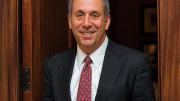At the end of most weekdays during the academic year, I settle into my chair, take a deep breath, and open my correspondence folder. Inside are at least twenty-four hours’ worth of mail addressed to the president—emails and postal mail, handwritten and typed on notecards, postcards, stationery, the list goes on. People from across the University write to me. People from around the world write to me. They extend invitations, seek guidance, and share their thoughts on all things Harvard. They convey to me their hopes and fears in equal measure, and their openness invariably reminds me why I decided to devote my career to education. I hear regularly from children and parents, from classrooms and teachers, who want to know more about what happens on our campus and how college can be part of their futures. Sometimes, to my great amusement and occasional astonishment, old acquaintances turn up and make my evening with a long-forgotten anecdote or photograph.
But, as anyone familiar with my role would guess, it’s not all pleasantries. One of the many things that makes my job challenging is that many people who went to college think they can run one. Week after week, pointed polemics also fly over the transom. Harvard does nothing right. We are either asleep at the wheel or woke beyond reason, unforgivably ignorant of our past or overly obsessed with it, indulgent of fools and tyrants or blithely unaware of their existence. We should admonish and shame those whose views do not match our own. We should have an institutional position on every possible public issue, and I should speak to each one personally. If the University accomplishes something—a begrudging admission—it is either too much or too little, too late or too soon. Even the construction of a new building can provoke outrage (as if our campus were fully formed when founded in 1636). I never cease to be amazed by how much attention people pay to what happens at Harvard—or by how much relentless criticism we seem to receive from all directions..
What emboldens people to send such messages? Clarity came during a recent trip abroad. I was hosting a question-and-answer session at a high school, and a student asked me why adults are so eager to criticize young people for talking too much about history, for seeking to put the present in the context of the past, even when that context is difficult, even painful, to confront. I answered that it is far easier to be a blind patriot than a loving critic, far easier to move forward without looking backward, without looking closely. In that moment, five years and counting of strongly-worded barbs made more sense to me than they ever had before. Absolutes and outrage offer a kind of comfort that retrospection and introspection rarely provide.
Being a loving critic of our institutions and our communities requires a great deal from us. Though we need to be respectful of our traditions, we should not be unwilling to depart from them. Similarly, we have to be willing to ask difficult questions. Where have we or our predecessors failed to live up to the values that we wish to embody in the present and transmit to the future? What went wrong? Who was hurt? How can we do better? Change is hard at a place as old and venerable as Harvard. But one reason we have persisted for close to four centuries is that our predecessors were willing to answer these questions and to adapt in response to a world that continued to change around them. Our University is not the same place today that it was when most of us graduated, let alone what it was a few hundred years ago. Leadership necessarily involves managing change because if you are not managing change, you are presiding, not leading. I am not suggesting that leaders should be immune from criticism, but that criticism should come from a serious desire to improve upon a place about which we all care deeply.
My hope for the year to come is that loving critics continue to challenge us to be better in every dimension of our work. That is how universities advance, that is how humanity progresses. My correspondence folder will be no thinner for having made this wish, but I believe that Harvard—and other institutions built by the people, for the people—will be improved considerably if it comes true.
Sincerely,
Lawrence S. Bacow
President









